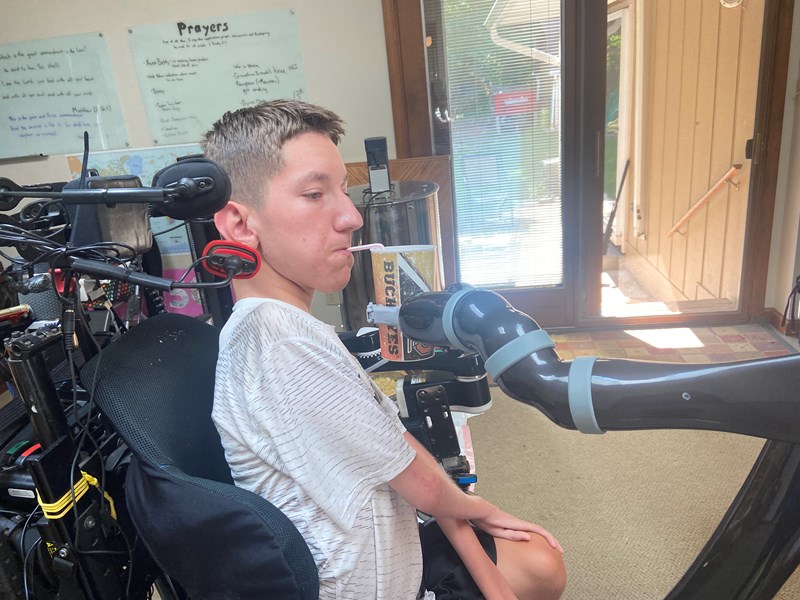Advocates for Basic Legal Equality, Inc. (ABLE) is a non-profit regional law firm that provides high quality legal assistance in civil matters to help eligible low-income individuals and groups in western Ohio achieve self reliance, and equal justice and economic opportunity.
Adison’s Story

Being able to complete daily living activities is something most people don’t have to think about when they are teenagers. ABLE has been able to help many people navigate the complex Medicaid system with legal appeals and other advocacy. It is always gratifying when they receive the help they need through medical equipment and devices that facilitate the independence they deserve. The following story is complex but worth the read. We thank Adison and his family for allowing us to share his journey to greater independence as he moves toward adulthood.
Adison’s Story
17-year-old Adison Delp lives with Arthrogryposis Multiplex Congenita, a condition that causes muscle weakness throughout the body and severely restricts the use of his upper extremities. He has been using a wheelchair since he was a toddler. Advocates for Basic Legal Equality, Inc. (ABLE) first represented Adison in 2020 at a state hearing to assist him with securing an electric wheelchair through Medicaid. Over the past two years, Adison has achieved a level of independence previously unavailable to him, operating the wheelchair by using a combination of head and chin access, switches for mobility, and activation of power seat functions.
New Request for a Robotic Arm
Adison’s parents contacted ABLE again in February 2022because they needed assistance navigating Medicaid once more, this time for a robotic arm payment approval. The arm would allow him to complete activities of daily living (ADLs), such as shaving, combing his hair, brushing his teeth, eating, drinking, and dressing without assistance from a caregiver. The arm would also allow him to open and close doors, remove a credit card from a wallet, play chess and other games, and do many other daily activities that people without disabilities take for granted.
One Step at a Time
The first step in trying to get an atypical item approved through Medicaid is to submit a “prior authorization request.” A prior authorization request is a process required by the Ohio Department of Medicaid to determine coverage and obtain approval to pay for the proposed treatment, service, or item. The approval is based on medical necessity. Adison’s physical therapist submitted the request in December 2021 but was denied because the Medicaid plan asserted the item had no medical purpose and was for “comfort and convenience.”
ABLE attorney Rebecca Steinhauser appealed this decision and represented Adison in the state hearing process, where Adison’s physical therapist testified extensively about the medical necessity of the robotic arm. Despite the overwhelming testimony and written evidence provided, the appeal was overruled. The state hearing decision was affirmed on administrative appeal.
Arguments in Support of Adison
When an administrative appeal is affirmed, the next step is an appeal to the county common pleas court. Steinhauser and Legal Aid of Western Ohio, Inc. (LAWO) attorney Allma Miller assisted Adison with filing an appeal to the Richland County Common Pleas Court. The attorneys argued that the Ohio administrative code conflicts with the federal durable medical equipment regulation because it places an exclusion on coverage of certain medical equipment or supplies without an individualized assessment as to whether an item is primarily used to serve a medical purpose.
In addition, the attorneys argued that the robotic arm clearly has a medical purpose in that it would not be useful for anybody who did not have a disability. The robotic arm would also allow Adison to perform ADLs independently, which aligns with a key purpose of the Medicaid program, to promote self-care and independence.
The attorneys made several other legal arguments to the court about medical necessity and ameliorating Adison’s medical condition.
Finally, while the lowest cost alternative must be considered in any prior authorization process, the attorneys argued that the robotic arm was the only alternative that would permit Adison to function as independently as possible.
The Final Outcome
A week after filing the appeal to the court, the Ohio Department of Medicaid contacted ABLE and LAWO with the good news that the agency was going to order Adison’s Medicaid-managed health care plan to approve the robotic arm! Adison is now enjoying the freedom and independence made possible by this innovative medical device. Next year, he plans to attend college. The robotic arm will provide Adison with a pathway to fulfilling his dreams.
Read how Adison feels about the assistance he received:
Dear Rebecca,
Thank you so much for fighting for me and helping me get my robotic arm. It means so much to me and I am already doing things with my new arm that I could have never done before! I know you spent a lot of time and did a lot of work for me to be able to have my robotic arm and I am very thankful for all your dedication. I am so excited to get to use my arm and see what all I can do with it. I feel like it’s opening up a new world for me to explore and be independent. I am hopeful that this has set the standard for other people who need this! Thank you so much for everything you did to help me and others have the ability to get this arm.
Sincerely,
Adison
